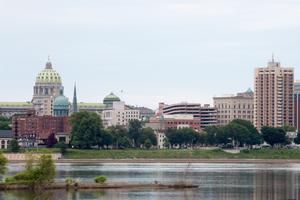Spotlight PA is an independent, nonpartisan newsroom powered by The Philadelphia Inquirer in partnership with the Pittsburgh Post-Gazette and PennLive/Patriot-News. Sign up for our free weekly newsletter.
HARRISBURG — Gov. Tom Wolf’s administration on Friday told nearly 9,000 state employees — more than 10% of its workforce — that it will stop paying them by the end of next week in order to reduce spending as the coronavirus shutdown continues to batter the economy.
The affected employees have jobs that cannot be completed through teleworking, according to the administration, which began shuttering state offices in mid-March to reduce the risk of spreading the virus. Starting April 11, those workers will have to use vacation, sick, or other personal leave time if they want to continue receiving paychecks. Otherwise, they can file for unemployment.
It is unclear how long the state will withhold paychecks, although Wolf has said that state offices will remain closed until at least April 30. The administration said it will continue providing health care benefits for all affected workers.
“This is an unprecedented situation that has created fiscal challenges for employers, including the commonwealth,” said Dan Egan, a spokesperson for Wolf’s Office of Administration, which handles personnel matters.
More than half of the 9,000 affected employees — or about 5,700 people — work for the Department of Transportation, according to the administration. Another 908 are employed with the Department of Labor and Industry, and an additional 849 are with the Department of Revenue. State officials said essential jobs in those agencies, which have performed critical tasks during the pandemic, will not be affected.
The remainder of affected employees work in departments spread across the government.
Pennsylvania’s state government employs about 80,000 people. The Wolf administration could not immediately say how much money the personnel changes will save the state.
“The savings will depend upon the options that employees choose to utilize, which are paid leave, unpaid leave, and/or unemployment compensation,” Egan said.
The heads of the largest unions that represent state employees, although unhappy with the administration’s decision, said it was better than the alternative: layoffs.
David Fillman, executive director of Council 13 of the American Federation of State, County, and Municipal Employees, said affected workers at least have the option to use leave time to get paid until government offices reopen — although he acknowledged that no one knows when that might happen.
Stephen Catanese, president of SEIU Local 668, said state workers in his union receive, at a minimum, three weeks of paid leave time, between sick and vacation days, every year, which could help blunt the financial blow.
“We are cognizant of the fact that these are drastic times,” said Fillman, whose union represents about 41,000 state employees across multiple departments.
The latest personnel move follows a decision last week by the administration to lay off about 2,500 part-time and seasonal employees and interns. Those workers, including temporary clerical staff and employees who help out in departments across state government during busy periods, were placed on “leave without pay” in late March. There is currently no timeline to recall them back to work.
In addition to the layoffs and paycheck freeze, state agencies had already implemented a hiring and purchasing freeze for nonessential positions and goods.
Since the state reported its first coronavirus cases in early March, Wolf has shut down schools and issued a statewide stay-at-home order, directing residents to only leave their homes for medicine, food, or other services essential to living. Most significantly, on March 19, Wolf ordered all businesses except those deemed “life-sustaining” to shut down, leading to an unprecedented spike in new unemployment claims, which topped 1 million Thursday.
The shutdown order has already dealt a significant blow to the state budget, and the worst is yet to come. This week, state officials reported that tax revenues fell 6% short of expected collections in March, wiping out a surplus amassed during the current fiscal year. The lion’s share of Pennsylvania’s annual revenue comes from the state sales and personal income taxes, both of which are expected to fall well below estimates in coming months.
Compounding the situation is the unknown, as state health officials do not yet know when cases of the coronavirus in the state will peak and begin to subside. That makes it impossible to predict when the economy can begin to return to normal, or how long businesses must be closed.
100% ESSENTIAL: Spotlight PA provides its journalism at no cost to newsrooms across the state as a public good to keep our communities informed and thriving. If you value this service, please give a gift today at spotlightpa.org/donate.
